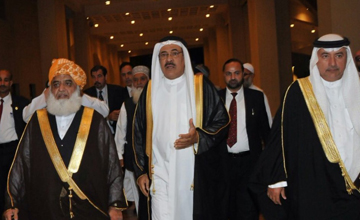Despite attempts by the state-run media to advocate peaceful coexistence, the Bahraini government continues to promote religious intolerance.
On March 19, the Bahrain Association for Religious Tolerance and Co-existence invited the Pakistani cleric and politician Fazl Ur Rehman to deliver a lecture on religious coexistence at the Isa Cultural Center in Bahrain. Fazl Ur Rehman, a pro-Taliban parliamentarian, praised the government of Bahrain in his lecture and said that Bahrainis enjoy political and religious freedom under the leadership of King Hamad bin Isa al-Khalifa.
Yet the following day, Bahraini authorities summoned Sheikh Maytham al-Salman, an internationally respected interfaith leader and the head of the Religious Freedom Department at the Bahrain Human Rights Observatory, over a religious lecture he had delivered last November. In another case, the Appeals Court in Bahrain sentenced Sheikh Abdul Zahraa al-Mubasher on March 30 to two years in prison over a religious speech. Additionally, last month the Bahraini government deported Sheikh Mohammed Khojasta, a prominent Shia leader, and stripped him of his Bahraini nationality after the government arrested him and charged him with “illegal residency.”
Since the uprising in February 2011, the Bahraini government has continued to discriminate against the Shia population. Security forces have demolished Shia places of worship, arrested individuals for attempting to pray in the site of demolished mosques, and have targeted Shia citizens and clerics. Last October, security forces in Bahrain took down flags and banners from houses and religious centers to mark Ashura, the day on which Shia mourn the martyrdom of the Prophet Mohammed’s grandson. Furthermore, the government summoned five Shia clerics and preachers for interrogation about speeches they made during Ashura.
These sectarian practices carried out by the government call into question Bahrain’s commitment to the principles of religious coexistence and the protection of religious freedom.





